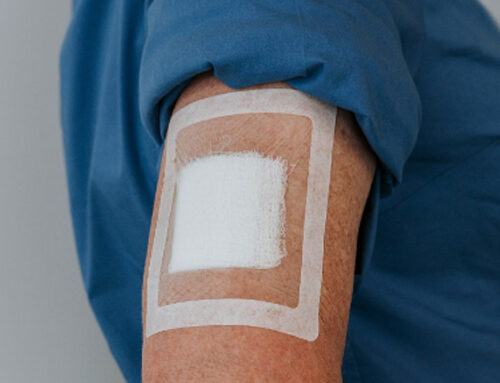Adhesive bandages and dressings are commonly used to cover wounds, secure catheters and hold medical equipment and transdermal patches in place. In most cases, removal of the dressings presents little difficulty apart from slight patient discomfort. However, in a significant number of cases further complications arise due to medical adhesive-related skin injuries (MARSI).
What is MARSI?
MARSI is an injury to the skin caused when adhesive bandages are removed. Symptoms include erythema (redness of the skin), epidermal tears, skin erosion, and small blisters, also known as vesicles. The condition is painful and the affected areas are susceptible to further infection. Depending on the patient’s skin and the extent of the injury, the top layer of the skin may actually be torn off along with body hair. The presence of MARSI adjacent to a wound or treatment site may complicate treatment, increase the cost of care and delay recovery.
Who Is Most Susceptible To MARSI?
According to a journal from the American Nurse Association, anyone with an unusual skin condition may be susceptible, especially those whose skin layer is particularly thin. This includes infants as well as elderly people. Other factors that increase the risk include:
- Dry and fragile skin
- Illnesses affecting blood circulation that compromise blood flow to the skin
- Skin thinning caused by medication such as steroids
- Poor nutrition
- Dermatitis, eczema and skin allergies
- Dehydration
- Radiation and chemotherapy
- Age-related illnesses
MARSI may also affect patients whose skin appears to be healthy, especially if adhesive bandages and dressings are frequently changed.
Prevalence of MARSI Across All Healthcare Settings
Numerous studies have taken place to determine the incidence of MARSI. Results vary considerably and are generally related to the patient’s age and condition. In a random sample of MARSI studies, the lowest incidence of MARSI recorded was 5.8 percent for outpatients attending an academic medical center, and in a U.S. study it was approximately 13 percent.
As would be expected, the incidence among oncology patients, whose immune systems are compromised, is higher. In this Chinese study, 19.7 percent patients experienced MARSI while in another Chinese study, the incidence was 29.8 percent.
Approximately 16 percent of elderly patients in long-term care experience MARSI, while in neonatal intensive care, the incidence of skin stripping due to adhesive tape was 17 percent.
Significant Additional Treatment Costs
Based on these figures, it can be expected that nearly 15 percent of hospital patients will experience an MARSI injury. While the U.S. costs for treating MARSI aren’t widely available, figures from the UK indicate that treatment costs around $100. Because MARSI is a hospital-acquired condition, it’s quite possible that pay for performance programs won’t cover treatment costs.
Using the Right Wound Care Products Reduces MARSI
Conventional ways to reduce the risk of MARSI are referenced in this 2013 article in Journal of Wound Ostomy Continence Nursing and include selecting the best type of tape, taking into consideration the degree of adhesion required, the location of the injury and the potential risk of MARSI along with other considerations. While doing this may well reduce the severity of the condition, it doesn’t eliminate the problem entirely. The core of the problem is the residual strength of the adhesive,which, if too high, may tear the skin when the bandage is removed.
Comfort Release Solution
A solution to this problem has been a long time in coming, but it is finally here.
Comfort Release discovered the answer. It was to temporarily disable the adhesive when removing the bandage. This is possible through incorporating a special polymer into the adhesive backing that, temporarily, causes the adhesive to release when rubbing alcohol is applied. The patient feels no pain when the bandage is removed and the risk of skin tearing is eliminated.
This innovative product is available in 1-inch and 2-inch wide tapes and bandages. Contact us to learn more and request a free sample.


